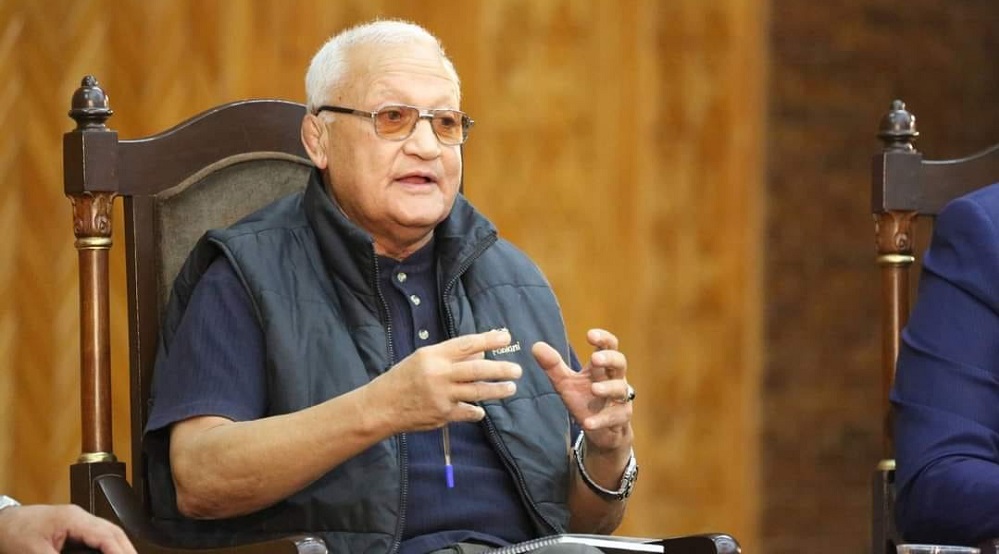Today marks the 81st birthday of Mohammad Azam Rahnaward Zaryab, one of the few writers whose name is etched not only in the catalog of works but in the very fabric of Afghanistan’s modern literary history. Born in Kabul on August 25, 1944, Zaryab grew up in the city and became a voice that rose from the narrow alleys of Rikakhana to stand among the most important storytellers in Persian literature of the past century. He passed away in Kabul on December 11, 2020, after an illness.
After graduating from Kabul University’s Faculty of Journalism, Zaryab pursued advanced studies in Britain. Upon returning to Kabul, he wrote for various newspapers and publications. During the civil war of the 1990s, he left for Pakistan and later France, spending years in exile. After the fall of the first Taliban regime, he returned to Kabul and worked with emerging media outlets, including TOLO TV. This interweaving of journalistic experience and literary creativity gave his prose its distinctive precision, observational sharpness, and social depth.
Zaryab’s body of work is remarkable in both scope and form. His short story collections—The Enchanted City, The Man Whose Shadow Left Him, The Horse Thief, And It Rained, The Dog and the Gun, and The Snakes Beneath the Oleaster Trees—combine ethnographic sensitivity with poetic language, capturing the marginalized and ill-fated residents of Kabul in poignant, enduring portraits. His novels, including Golnar and the Mirror and I Wandered in the Citadel, extend his narrative experimentation into longer forms, blending social realism, urban memoir, and touches of the surreal. His essay collections—Margins, The Mute Dreamer, The End of Three Invulnerables, and What We Wrote—reveal his intellectual engagement and critical insight. His work Shirts reflects his engagement with world literature as a translator.
Stylistically, Zaryab stood as a bridge between tradition and modernity. His diction and rhythm were rooted in classical Farsi prose, yet his narrative structures, fluid perspectives, linguistic economy, and attention to urban detail placed him squarely within modern fiction. His dark humor was never for amusement but rather to cut through reality, while his symbolism—especially in depicting the city—constructed an “emotional geography” where Kabul itself became both a physical setting and a narrative character. This duality reached its peak in I Wandered in the Citadel, where Afghanistan’s wounded capital emerged as a living, memory-laden presence.
Like many Afghan intellectuals, Zaryab’s life was marked by exile and return. His years in France during the 1990s and his subsequent homecoming after the fall of the Taliban deepened his sensitivity to the themes of lost and regained homeland, collective memory, historical ruptures, and the slow death of urban spaces—motifs that resonate throughout his works.
Zaryab’s influence extended far beyond his writing. For younger generations, he was a model of possibility: proof that one could write globally while rooted in local language, that beauty and truth could be forged out of institutional limitation and chronic insecurity. Many emerging writers in Kabul and the provinces during the 2000s and 2010s saw themselves as his “indirect students,” learning from him how to transform suffering into form, and form into moral testimony. Scholarly studies have confirmed this, recognizing him as one of Afghanistan’s most pioneering contemporary writers and a guardian of the Farsi language.
His absence left a dual void: in literature, the loss of a writer who could align narrative language with ethical sensitivity at historical crossroads; and in society, the silence of a journalist who knew how to extract story from news and insight from story. This void has been felt even more sharply since the Taliban’s return to power, amid escalating restrictions on writers and media, when voices like Zaryab’s are most needed.
Methodologically, Zaryab redefined the “urban story” of Afghanistan. While earlier generations often leaned on rural romanticism or overt political slogans, he brought short fiction into the realm of fine-grained observation, concrete detail, and the lives of ordinary people. He remained faithful to the ethics of storytelling while never shying away from formal experimentation—playing with narrative time, interweaving memory and reality, and shifting perspectives. His seemingly simple prose opened paths to deep meaning.
The future of Persian literature in Afghanistan, under structural limitations and political pressures, is undoubtedly precarious. Yet this very difficulty underscores the importance of Zaryab’s legacy as a “measure of hope.” His works demonstrated that literature is not merely reflection but also resistance—not resistance of slogans, but of form. A language unafraid of censorship, and a narrative striving for truth with maximum honesty. Even as many writers and poets are driven into exile or silenced into quiet, Zaryab’s collections and novels remain an “open workshop” for new generations: a place to learn how to record the city’s voice, to extract beauty from failure, and to speak truth within the limits of language.
Ultimately, Rahnaward Zaryab was a writer who portrayed Afghanistan not through orientalist clichés or politicized slogans but through tangible human lives and the intricacies of everyday existence. His humble humor, restrained imagination, ethical gaze, and linguistic precision define his style. For this reason, any discussion about the future of Farsi literature in Afghanistan inevitably circles back to him—to the writer who showed that even in the most complex chapters of history, one could light a lamp and translate wounded Kabul, with all its pain and sorrow, into the language of world literature.
The views expressed in the “Your View” section reflect those of the authors and are not necessarily Deeyar’s official position.







